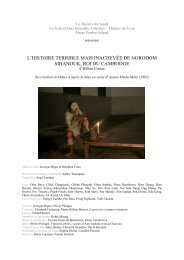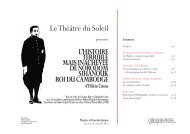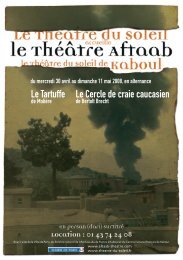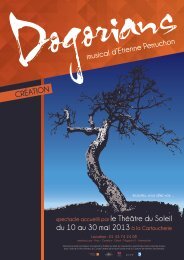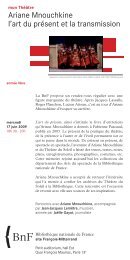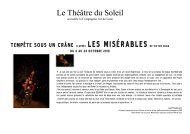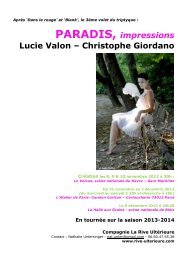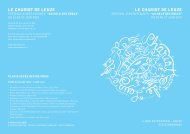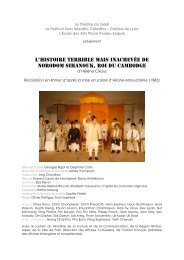la revue de presse - Le Théâtre du Soleil
la revue de presse - Le Théâtre du Soleil
la revue de presse - Le Théâtre du Soleil
You also want an ePaper? Increase the reach of your titles
YUMPU automatically turns print PDFs into web optimized ePapers that Google loves.
open society panelActors preparing toperform at Théâtre<strong>du</strong> <strong>Soleil</strong>’s workshopin Afghanistan,2005. Courtesyof Duccio Bellugi-Vannuccinithere is an evangelical school, ASCHIANA[Afghan Street Working Children and NewApproach], which we discovered <strong>la</strong>te in ourstay, unfortunately, which brought stu<strong>de</strong>nts tothe foundation to show us one of their p<strong>la</strong>ys,which they called Against Weapons. ASCHI-ANA is an incredible organization; they workwith street children.As for the university stu<strong>de</strong>nts, some ofthem were coming to the workshops just tosee things, to be in a quiet p<strong>la</strong>ce, to find outwhat was happening there. They were not allcompletely involved in the theatrical work,but gra<strong>du</strong>ally there was a solid regu<strong>la</strong>r groupof about fifty who came every day. Someof them even had to be stopped from comingonstage — sometimes I would have to tellsomeone, “No, you’ve already been onstagethree times, you can’t go onstage today. Youhave to leave the stage today!”We brought costumes from our theaterin Paris, and masks. I don’t know why, but Ihad this i<strong>de</strong>a that we would do mask work andnothing else. I knew that in three weeks wewouldn’t have time to do more, and that maskswould be the instruments that would createtheater as quickly as possible. I could have beenwrong, but apparently I was not: they had neverseen masks in their lives. Never. They had neverheard of Harlequin, or commedia <strong>de</strong>ll’arte, orNoh, or Kabuki, or anything like that. Whenwe first showed them the masks, it was really asif something was being recalled from an ancientmemory. They recognized the masks withoutever having seen any before. It ma<strong>de</strong> me thinkthat theater is probably the first art form, alongwith painting, that humankind practiced — an<strong>de</strong>ven if tradition or religion forba<strong>de</strong> these artsfor a period of time, it remains insi<strong>de</strong> us. Whenthe Afghan actors became familiar with thesemasks, they were <strong>de</strong>eply happy, because masksare sha<strong>de</strong>s of personhood. All the masks wetook there are ur-masks, very, very traditional,antique masks. And their faces are universal.They can be recognized even by people whohave never seen such a thing.70We got started, and off we went: theyhad to undress, to dress in the costumes,and they had to un<strong>de</strong>rstand what it meant toput such a thing on. Théâtre <strong>du</strong> <strong>Soleil</strong> actorshelped them, always, showing them: “No,you can’t dress like that, you look like nothing.This is ugly. This is not the character. Allright, you’re dressed like that, but you can’tmove, so what is going to happen? Your hatis over your eyes; you can’t see, you can’t hear,you can’t, you . . . ” And little by little someof them — I would not say all — started to beable to dress themselves, to recognize whatma<strong>de</strong> a character, the volume they had to take,and, well, there was theater. Some theater wascreated, nearly every day. I think we had onejour maudit, a cursed day, when nothing came,absolutely nothing — even the actors from theThéâtre <strong>du</strong> <strong>Soleil</strong> were cursed, which happens.But otherwise theater was discoveredon this stage every day, the most surprisingtheater.After four or five days, we started workingon a specific theme, which was false marriages,false marriage — but, of course, not inAfghanistan. In our societies, three hundredyears ago. So there they were, sort of improvisinglove scenes, with one Afghan womanand French actors, or Afghan actors. And,well, we were in a normal kingdom, the kingdomof art, where we never spoke about certainthings: not once did I hear, “I’m Uzbek,”or “I’m Tajik.” Not once.When we were organizing the visit, Ihad told Robert that I wanted women inclu<strong>de</strong>damong the participants or I wouldn’t come. Ifelt that I was creating difficulties for him. Hesaid, “Yes. Huh. I will try. Yes.” Every timewe spoke on the phone I asked, “Are therewomen?” and he would say, “Yeah, well, it’scoming. It’s coming.” Of course, when wefinally arrived in Kabul, I wouldn’t have toldhim “OK, we’re going back because there areno women.” But I was really hoping. Andluckily he succee<strong>de</strong>d in finding three, thenfive, then six. They were very courageous,



